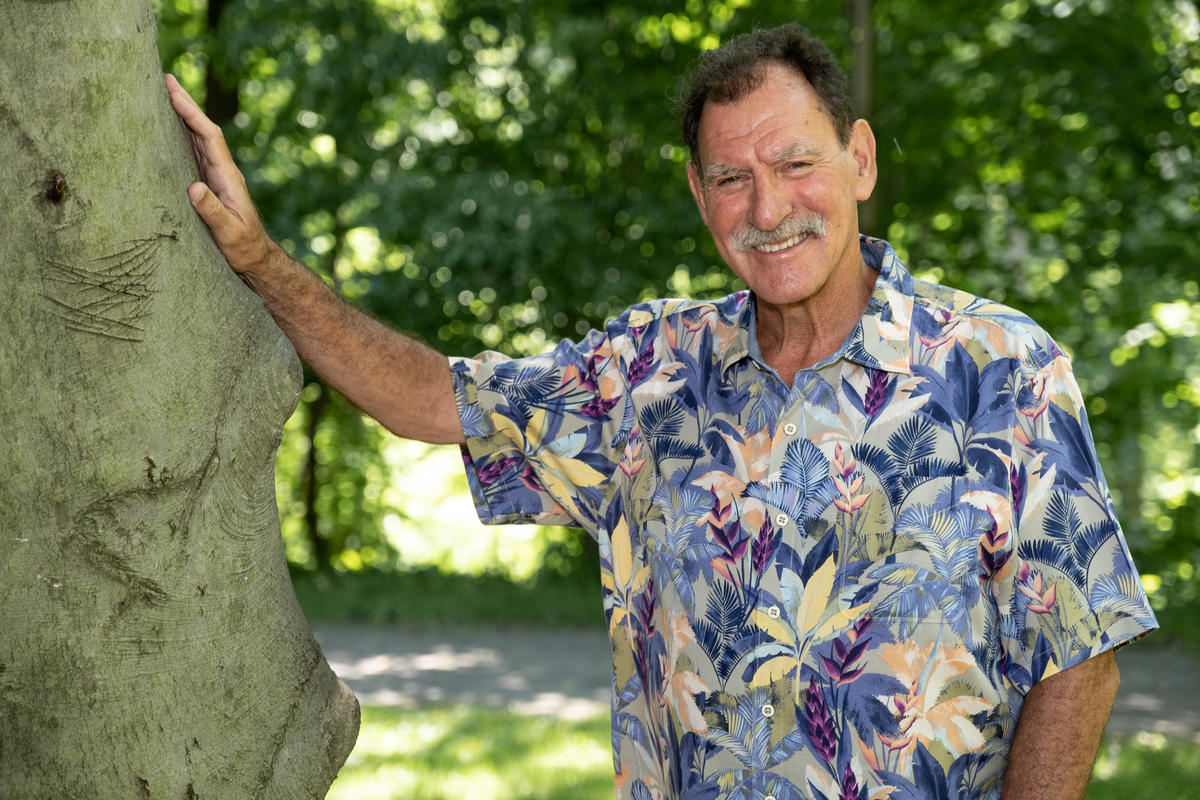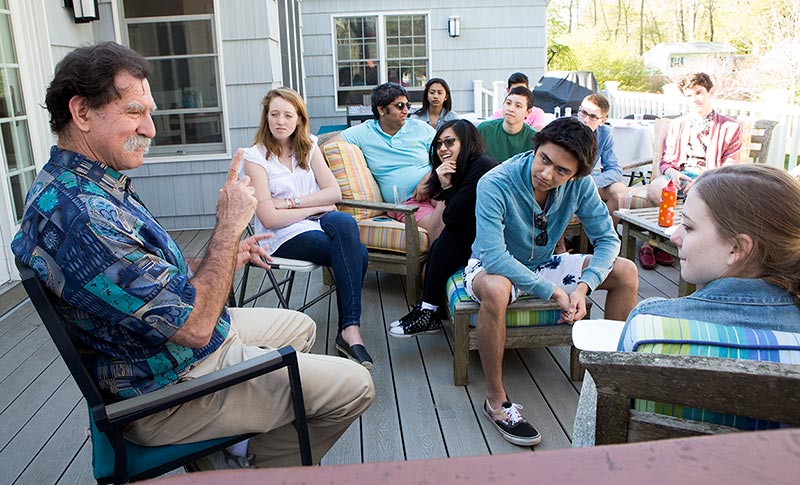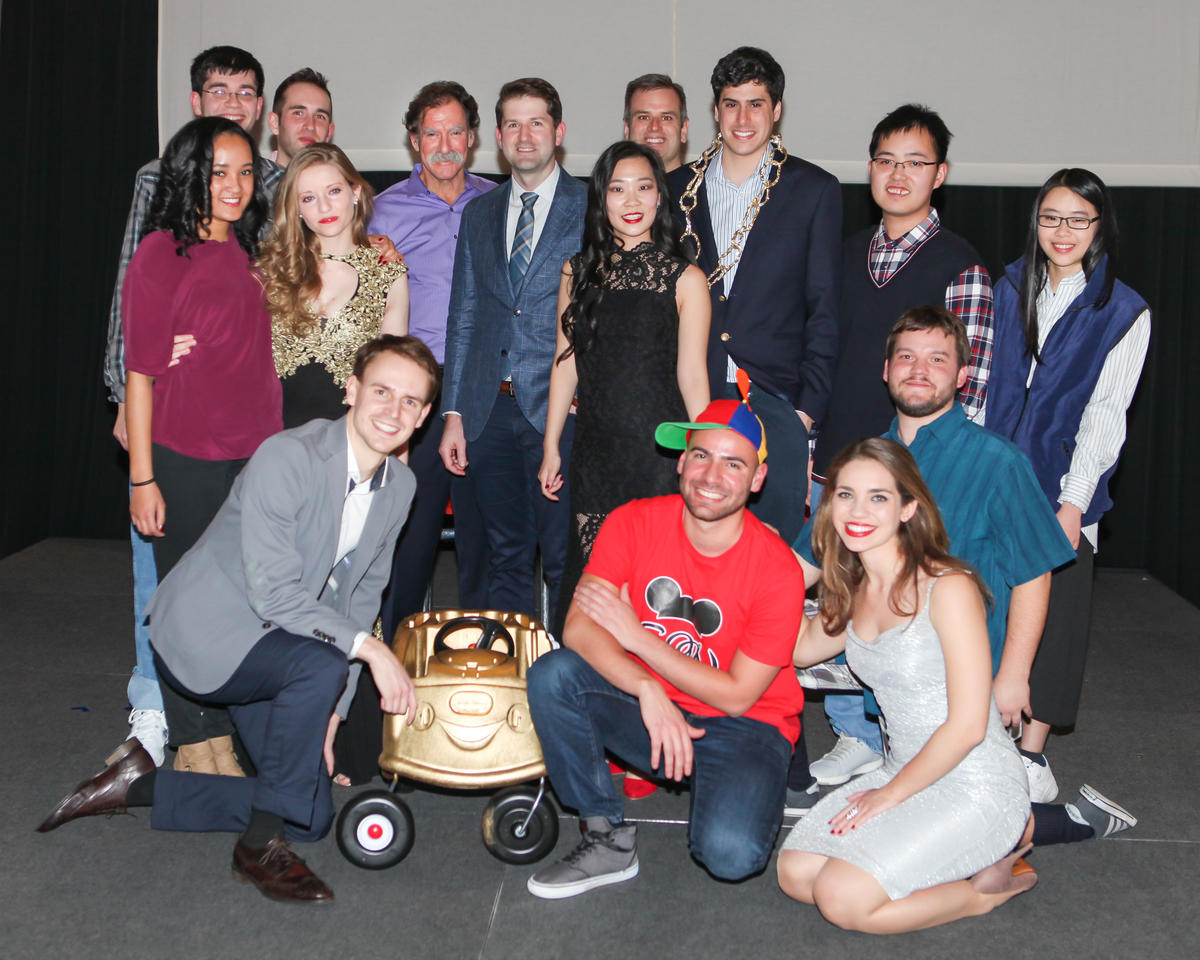Paul Reider: A Noble Endeavor
Paul Reider, Lecturer with the Rank of Professor in the Department of Chemistry, has had an exceptional career partly based on the fact that he “hated” the way chemistry was taught when he was an undergraduate at New York University in the 1970s.
That, and a trip to the World’s Fair in 1964 where a magic show presented at the DuPont Pavilion helped convince him to pursue a career in chemistry.
This month, after 13 years at Princeton, the renowned, inimitable, Hawaiian-shirt wearing professor is stepping down from his teaching duties. Reider’s classes, including a freshman seminar called “Drug Discovery: From Snake Venoms to Medicines,” have been among the most popular in the Department, at times filling up within minutes of the course posting.

Photo by C. Todd Reichart, Department of Chemistry
“It’s the simplest thing in the world. If you want to capture people’s imaginations and inspire them, you make the science relevant. And you do that by telling stories and connecting them to their lives. The problem with the way they used to teach chemistry at NYU was that they made it uninteresting, unconnected,” said Reider.
“It’s a lot easier now because of COVID. People get it. They are interested in vaccines and how they work – questions you would never have gotten before.”
In 2008, Reider started his career at Frick as a pharmaceutical specialist and lecturer following a post as worldwide head of chemistry research and discovery at the biotechnology giant Amgen, Inc. Seven years later, he was promoted to lecturer with the rank of professor, a distinguished title reserved for lecturers who have demonstrated significant achievement in their fields.
Prior to Amgen, Reider spent 22 years at Merck/MRL where he rose through the ranks to the position of vice president, process research, before retiring from the company in 2002. At Merck, Reider led the manufacturing process for Merck’s landmark drug Crixivan, an antiretroviral released in 1996 and still used globally in the treatment of AIDS. It was the first effective treatment for the deadly virus.
“When I joined Merck, I had learned about team work and I had learned about the passion of science and publishing, and I knew what I wanted to do with my life,” said Reider. “I wanted to be involved in science that is helping people.”
Throughout his nearly 30 years in industry drug development and production, Reider contributed to the development of 16 approved drugs that combat some of humanity’s worst diseases, including HIV, tuberculosis, asthma, and malaria. He has served on a number of editorial and advisory boards, and continues to hold committee positions with the Medicines for Malaria Venture and the TB Alliance.
He has received numerous academic and professional honors, including the National Academy of Sciences Award for Chemistry in Service to Society in 2011. Reider has authored over 285 research papers, and has more than 30 patents to his name.

Photo by Denise Applewhite, Office of Communications
Reider earned his A.B. in psychology from New York University, and his Ph.D. in organic chemistry from the University of Vermont. He did postdoctoral work at Colorado State University.
“There are so many ways in which Paul’s career has been spectacular. First, he’s a very good human being. He’s very generous, and he cares enormously about people and doing good work. When he came here, Paul wanted a role where he could demonstrate what pharmaceutical science really is,” said David MacMillan, the James S. McDonnell Distinguished University Professor of Chemistry. “It was the easiest decision the Department ever had to make because his wealth of experience was unparalleled. At the same time, he’s such a fantastic communicator that we knew from day one he would be just fantastic.
“He’s a rock star in the pharmaceutical world, so he was able to call up the best people from industry to talk about the drugs they had developed. Princeton undergraduates had a front-row seat on discussions about all these great medicines that have been discovered from the people who discovered them, and it was all because of Paul.”
Sydney Boyer, a recent graduate who took both the Freshman Seminar on drug development and Reider’s upper-level CHM 440 class, had this to say about him: “He is one of the most generous and helpful professors I have encountered at Princeton. He offered career advice, fostered a warm, classroom environment, answered emails enthusiastically, and developed engaging activities on top of his class curriculum.
“Professor Reider always wanted all of his students to succeed, and believed we had so much potential. I know my peers and I will remember Drug Discovery as one of our most enjoyable classes at Princeton,” Boyer added. “It was due to Professor Reider.”
PAUL IN HIS OWN WORDS
Below are some of the most memorable lines from a recent interview with Reider.
On Teaching:
“I had no idea until I worked here how hard it is to teach. Everybody gave me notes, lectures, tips. But I was terrible the first two years. The graduate students were very patient with me, and the undergraduates avoided me because they knew. And then, finally I was able to do what I wanted to do, which was to create a course to teach undergraduates what they needed to know about health, medicine, and new drugs so they would actually think about going to those areas for their careers – or, even if they went to Wall Street, to fund those things.”

Photo by C. Todd Reichart
“Some people will only take one science class in their whole lives, and these people end up in Congress, they end up on the Supreme Court, they end up working in the White House. We need to make science approachable.”
“You never invite an outside speaker unless you’ve already heard them speak. You want to know for sure that they’re not going to turn the kids off. For my classes, I carefully selected people who had amazing stories to tell about the drugs that they discovered, their important medicines that had impact on human lives whether it was malaria, TB, HIV.”
“I think one of the hardest things in the world, for any organization, is as they get larger to maintain the feeling of being small and collaborative. How do you do this? You do it by recruiting young people and you teach them the culture – what made Princeton chemistry, how it evolved, the case studies that did work and didn’t work. These are really simple lessons, but people forget them. Don’t forget what made you successful.”
On Colleagues:
“I knew Erik (Sorensen) when I was at Merck. Erik is one of the best teachers of chemistry I’ve ever seen. My blackboard technique is not as good as Erik’s. I use three colors of chalk; he uses seven.”
“For many years, Jay Groves and I co-taught CHM 403 (Advanced Biochemistry). I would teach the first part and then he would teach the second half about what nature does, which is more impressive. And that worked out great.”
“Marty [Semmelhack’s] lectures were crisp and precise. I wish I could do what he does: he doesn’t ramble and tell stories the way I do.”
“Rob L’Esperance does a wonderful job making sure that chemistry majors don’t fall behind and that they’re doing well on their research. But we don’t know who the chem majors are for a couple of years. So, we have two shots, really: freshman year and sophomore year. And it’s really those people teaching those classes who are the ambassadors of chemistry.”
On Retirement:
“There’s a freshman seminar I always wanted to take about the dark side of Walt Disney, the dark side of all those classic movies. Maybe I’ll do that now.”
“With the pandemic, we lost a year on the bucket list. Our trip to Ireland has been postponed twice. Maybe we’ll get there, maybe we won’t. We’ve never done Scandinavia. We’ve never done the Arches and Canyonlands parks. Plus, many of my mentors who are older than I am are less ambulatory. So, I’d like to get out there now.”
“I think I have been able to impact enough people so that my legacy is measured by the hundreds who I think I’ve convinced that discovering novel drugs, especially for unmet medical needs, is a noble endeavor. It’s a noble endeavor.”
